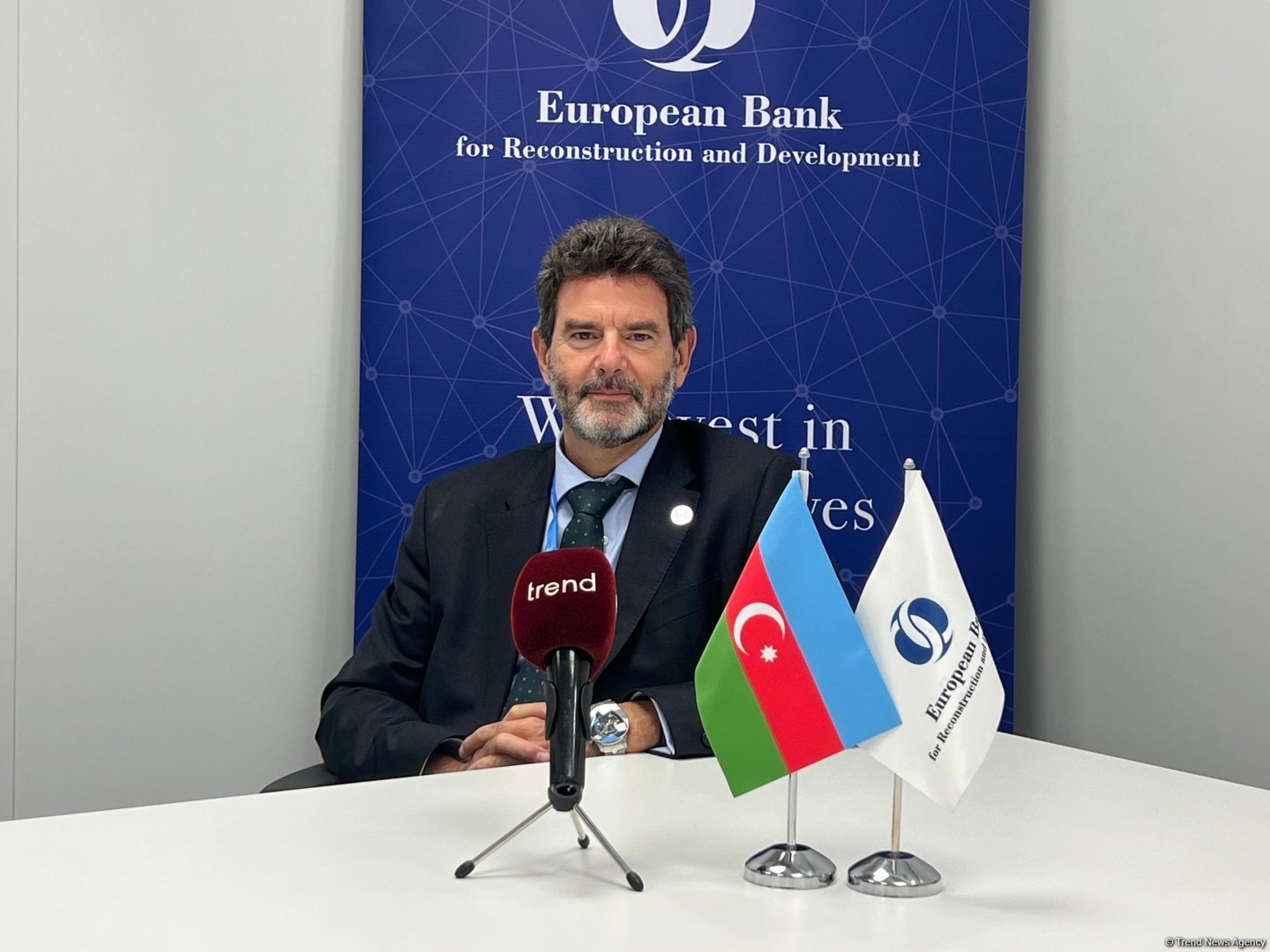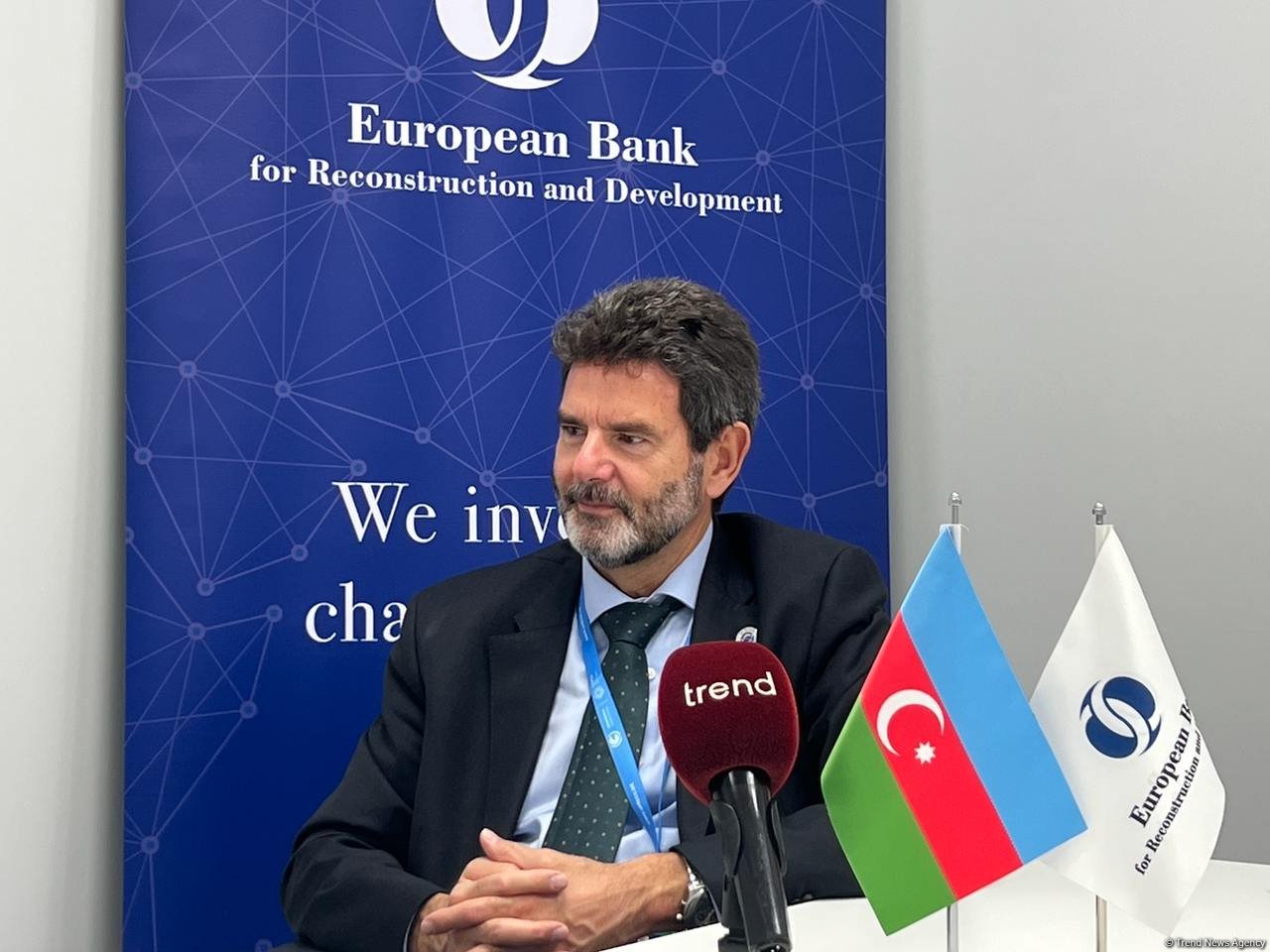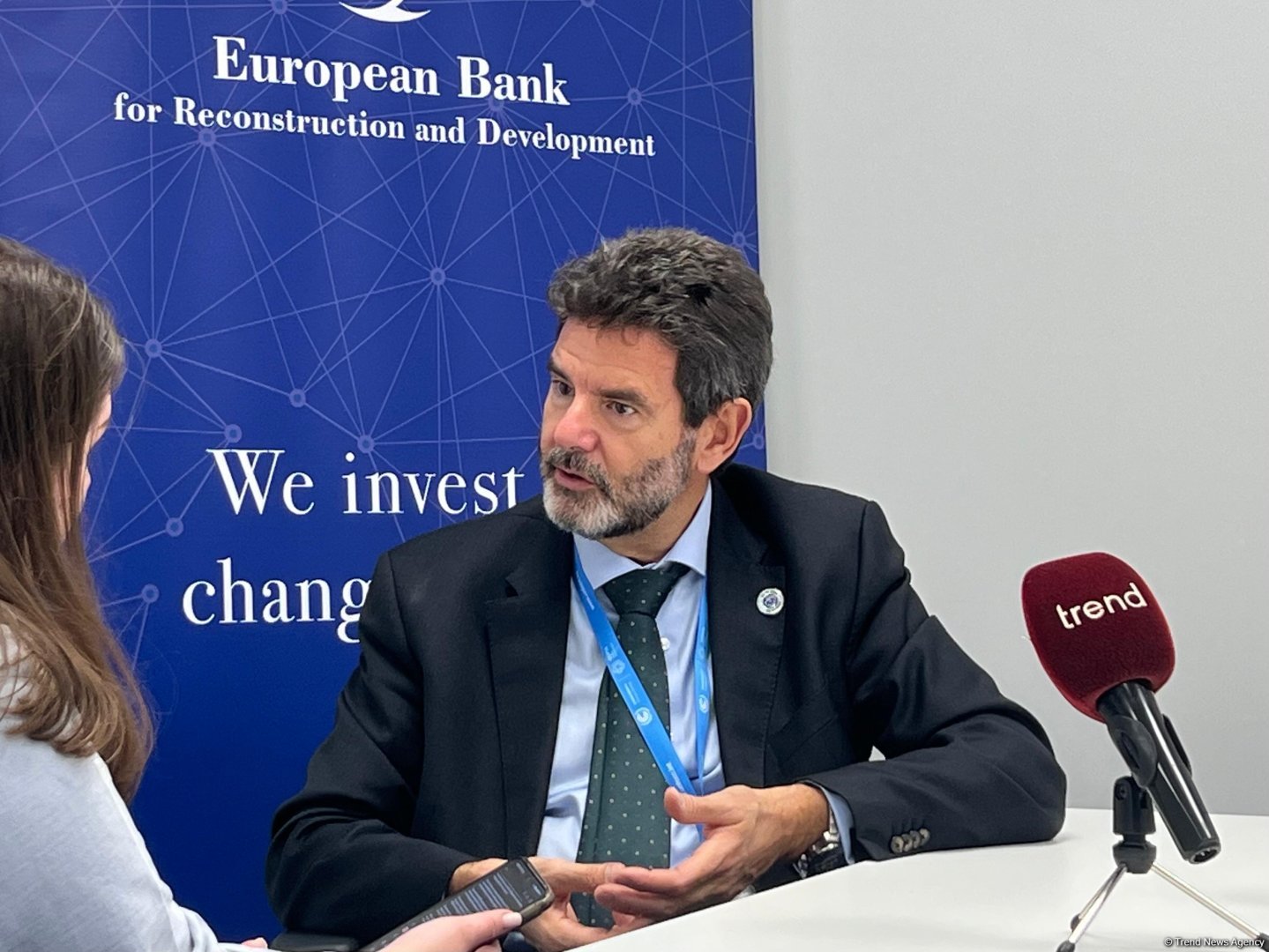BAKU, Azerbaijan, December 5. The European Bank for Reconstruction and Development (EBRD) is intensifying its commitment to green financing, with over 50 percent of its portfolio dedicated to projects that align with climate goals, said Alkis Vryenios Drakinos, Regional Head of the Caucasus for the EBRD, in an interview with Trend.
"We are positioning ourselves, and we already have a few achievements in stating that we are becoming, or we are, a green bank," Drakinos noted. "This is a commitment we made for Paris Agreement alignment a few years ago, and we have stepped up our efforts. Since 2022 and 2023, we have achieved our goal, and this year, we are doing even more".
The EBRD is collaborating with other multilateral development banks (MDBs) to amplify investment in climate-related projects. "We have a joint ambition to get it right in terms of how much investment will be necessary to achieve our collective goals," Drakinos explained. Together, MDBs are committing to invest 120 billion euros annually in climate projects until 2030.
However, this amount represents only a fraction of the estimated 2.4 trillion euros needed annually to combat climate change effectively. "120 billion euros is only a small percentage - just 5 percent - of the total investment that we are talking about," Drakinos emphasized. "The remaining 95 percent needs to come from the private sector and governments".
Drakinos highlighted the critical role of governments in mobilizing private sector investment by creating favorable regulatory conditions and market opportunities. "What governments need to do is help the private sector by establishing the regulatory conditions and creating market opportunities to mobilize private investment. This is where we as MDBs, and the EBRD in particular, have a role to play," he said.
The EBRD is focused on working with governments to establish a regulatory framework conducive to private investment. "We must join forces with governments and advise on how to create a regulatory regime that is conducive to private sector investment. Then, as a result, we can mobilize the private sector to participate because otherwise, we will be unable to do it," Drakinos added.
EBRD's renewable energy impact in Azerbaijan
Further, the regional director spoke about the significant financial support the bank is providing to Azerbaijan’s renewable energy sector through the development of two major solar parks in Bilasuvar and Neftchala.
"These two solar parks in Bilasuvar and Neftchala will be delivered and constructed by a joint venture between Masdar (75 percent) and SOCAR Green, showing Azerbaijan's commitment to supporting the green agenda and the country's green ambitions," he noted.
The projects, which represent an investment of 160 million euros, are being co-financed by the EBRD, the Asian Development Bank (ADB), and the Asian Infrastructure Investment Bank (AIIB). "AIIB, ADB, and EBRD are joining forces to finance this project and make it a reality," Drakinos emphasized.
These solar parks are part of a broader renewable energy strategy supported by the EBRD in Azerbaijan. Following the Alat solar project in 2022 and the Absheron Khizi wind project in 2023, the EBRD has facilitated the development of 1.2 GW of renewable energy capacity in Azerbaijan over the last three years.
"We are fully aware that Azerbaijan is an oil-rich country and that the economy is still largely dominated by the fossil fuel sector," Drakinos said. "However, we see strong political will and growing awareness of the global challenge, with Azerbaijan positioning itself as a country committed to renewable energy. Azerbaijan is set to be a strong player and partner in addressing the global challenge of climate change".
The EBRD’s commitment to Azerbaijan extends beyond renewable energy. The bank is also advancing initiatives such as the Green Cities program, which integrates sustainable practices into urban development projects, including water management systems.
EBRD tracks progress of new green corridor
The EBRD is closely monitoring key regional developments in the Caucasus, particularly the recent agreement between Azerbaijan, Kazakhstan, and Uzbekistan to establish a green corridor, the regional director pointed out.
"We are involved across the entire Caucasus and are closely monitoring new regional developments," Drakinos said. "Recently, the leadership of Azerbaijan, Kazakhstan, and Uzbekistan signed an agreement for a green corridor. It’s still early to discuss the specifics of the project since we need feasibility studies and other assessments. However, the political will for collaboration among these three countries, combined with the potential to channel the renewable energy of Central Asia and the Caucasus not only for domestic use but also for the European market, is very promising".
He added that if the project proves viable and bankable, EBRD is ready to support it. "All three countries are operational members of the bank, so we are well-positioned to assist. I am looking forward to further updates on this," Drakinos noted.
The EBRD is also paying close attention to the Black Sea cable project, which is part of the region’s green energy corridor. "This is a major project that is starting to become more understandable as the feasibility study is almost ready," Drakinos said. "Once it is shared with us, we will be reviewing it. We know that this energy corridor project can lay the infrastructure to transfer renewable energy from the Caucasus to Europe".
EBRD supports key Middle Corridor projects in Azerbaijan and Georgia
Underscoring the bank’s active engagement in projects related to the Middle Corridor, a vital trade route connecting Central Asia, Europe, and beyond, Drakinos emphasized the EBRD’s commitment to ensuring all financed projects align with the Paris Agreement.
"Whatever we finance in this sector will always include a green element," Drakinos noted. "We do not finance projects that are not compatible with the Paris Agreement’s conditionalities. Therefore, every project we support is aligned with the Agreement, and we incorporate relevant conditions to ensure compliance".
Drakinos highlighted several ongoing and potential projects under the Middle Corridor framework. In Azerbaijan, the EBRD has been actively financing the Azerbaijan Caspian Shipping Company (ASCO) to acquire vessels and cargo ships, aiming to facilitate trade along the route. "This is helping meet the demand for transporting goods between Central Asia, Europe, and beyond, both ways," he explained.
In Georgia, the EBRD is working on projects to enhance the efficiency of the transport sector, including support for the railway system and the development of the Port Community System, a digitalization initiative to streamline port operations. "This project will link the ports of Georgia, making the transfer and trading of goods between countries smoother and faster. It is also part of the Middle Corridor concept," said Drakinos.
The EBRD has also expressed interest in supporting the expansion of the Port of Baku in Azerbaijan. "We conveyed our interest to the Azerbaijani authorities regarding the expansion of the capacity of the Port of Baku, which is part of the Middle Corridor. We expressed our willingness to look into this when they are ready," Drakinos stated.
EBRD’s private sector investment model drives climate financing
Last year, we invested over 6.5 billion euros in climate, mobilizing around 25 billion euros from the private sector, Drakinos pointed out.
"We have been successful so far in mobilizing a lot of investment from the private sector," Drakinos stated. "For every euro we have invested, we have mobilized more than three".
Drakinos attributed this success to careful project selection and maintaining strong relationships with the countries where the EBRD operates. "Every project that we finance is in countries that are interested, as these countries are our shareholders. As a result, the risk surrounding our projects is low. The projects we finance are supported, which helps reassure private-sector financial investors. They can then focus on the merits of the project itself".
He emphasized the importance of working with high-quality project sponsors. "The people we are financing have proven track records in delivering projects. They are known for meeting timelines and staying within budgets. There are no cost overruns, unless there are unexpected surprises, but these are rare," Drakinos explained.
The EBRD’s model of securing financing from both the bank and its partners, along with ensuring tariffs and other financial elements align with market conditions, has been a cornerstone of its success. "The bankability of the projects is also guaranteed because of the tariffs and other factors. We work in countries that can afford to purchase at the prices we have secured. It’s a proven model, and we will continue to use it in the future," Alkis Vryenios Drakinos concluded.












